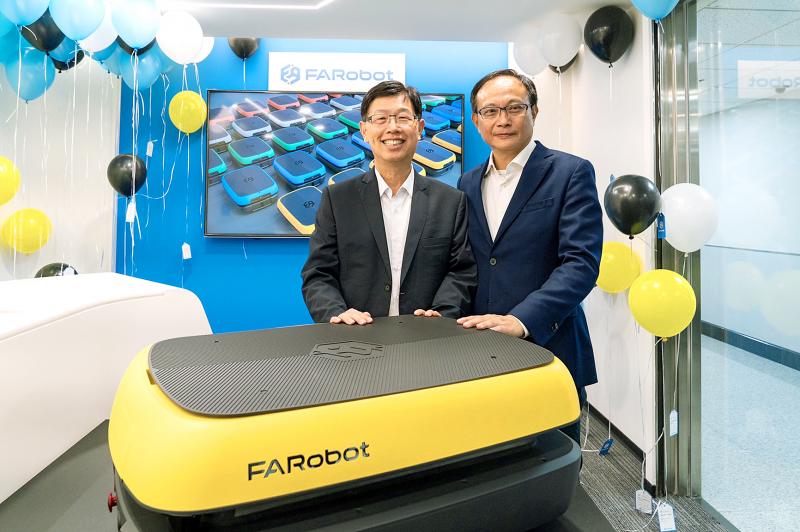Hon Hai Precision Industry Co (鴻海精密) and Adlink Technology Inc (凌華科技) have formed a robotic venture that aims to use “swarm technology” to create robots that can communicate with one another on the factory floor to optimize production efficiency.
Hon Hai is Apple Inc’s leading iPhone assembler and the world’s largest contract electronics maker, while Adlink supplies industrial computers and Internet of Things solutions.
Through a subsidiary, Hyield Venture Capital Co (鴻揚創投), Hon Hai holds a 51 percent stake in autonomous mobile robot (AMR) developer FARobot (法博智能移動), while Adlink owns the remaining 49 percent. Together, the two companies put up NT$200 million (US$6.82 million) in capital for the new venture, which opened its doors on Wednesday.

Photo courtesy of Hon Hai Precision Industry Co
FARobot general manager Ryan Chen (陳家榜) told the Taipei Times via telephone yesterday that “swarm autonomy” is a concept from the field of robotics.
It utilizes data distribution service technology to enable robots to share information with each other in a decentralized manner, he said.
“They are like ants or bees, and each individual unit is getting constant feedback from the others so they can work as a team,” he said.
This ability to adapt to change in real time is key to optimizing productivity, he said.
“The factory of the future is very fast-moving and full of changes,” he said. “The same production line could be making one product in the morning and another in the afternoon.”
“Our biggest challenge is to deliver the right raw material or components at the right time to the right place,” Chen said. “This will reduce the amount of time spent waiting rather than in operation.”
FARobot’s AMRs are to be deployed in Hon Hai factories within three years, he said.
“Hon Hai is the factory of the world so we can prove our concept there first, but of course we would want to expand our market after that,” he said.
At the opening ceremony at FARobot headquarters in New Taipei City’s Jhonghe District (中和), Hon Hai chairman Young Liu (劉揚偉) said the collaboration capitalizes on the strengths of each partner.
“With FARobot’s swarm technology and the respective domain knowledge of Hon Hai and Adlink, we can hope to build the foundation of a robotic business that will reach many industries,” Liu said.
Adlink chairman Jim Liu (劉鈞) said that FARobot would provide “smart factories with smart logistic solutions.”
“It is not enough just to make one machine, we must make a group of machines that can communicate with each other and cooperate,” he said.

Zhang Yazhou was sitting in the passenger seat of her Tesla Model 3 when she said she heard her father’s panicked voice: The brakes do not work. Approaching a red light, her father swerved around two cars before plowing into a sport utility vehicle and a sedan, and crashing into a large concrete barrier. Stunned, Zhang gazed at the deflating airbag in front of her. She could never have imagined what was to come: Tesla Inc sued her for defamation for complaining publicly about the vehicles brakes — and won. A Chinese court ordered Zhang to pay more than US$23,000 in

Taiwan Semiconductor Manufacturing Co (TSMC, 台積電) yesterday held its first board of directors meeting in the US, at which it did not unveil any new US investments despite mounting tariff threats from US President Donald Trump. Trump has threatened to impose 100 percent tariffs on Taiwan-made chips, prompting market speculation that TSMC might consider boosting its chip capacity in the US or ramping up production of advanced chips such as those using a 2-nanometer technology process at its Arizona fabs ahead of schedule. Speculation also swirled that the chipmaker might consider building its own advanced packaging capacity in the US as part

Taiwan Semiconductor Manufacturing Co (TSMC, 台積電) yesterday said that its investment plan in Arizona is going according to schedule, following a local media report claiming that the company is planning to break ground on its third wafer fab in the US in June. In a statement, TSMC said it does not comment on market speculation, but that its investments in Arizona are proceeding well. TSMC is investing more than US$65 billion in Arizona to build three advanced wafer fabs. The first one has started production using the 4-nanometer (nm) process, while the second one would start mass production using the

US President Donald Trump has threatened to impose up to 100 percent tariffs on Taiwan’s semiconductor exports to the US to encourage chip manufacturers to move their production facilities to the US, but experts are questioning his strategy, warning it could harm industries on both sides. “I’m very confused and surprised that the Trump administration would try and do this,” Bob O’Donnell, chief analyst and founder of TECHnalysis Research in California, said in an interview with the Central News Agency on Wednesday. “It seems to reflect the fact that they don’t understand how the semiconductor industry really works,” O’Donnell said. Economic sanctions would